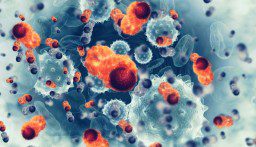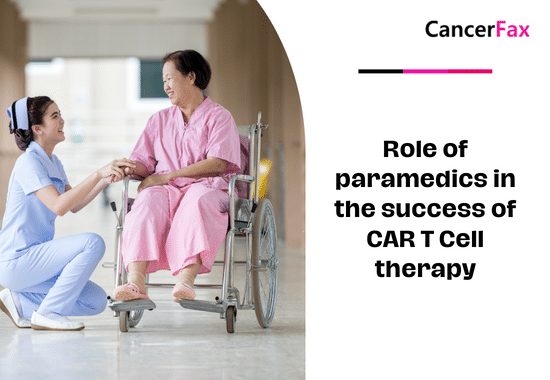februārīry 2023, a phase 1 trial at a single institution found that it was safe and possible for people with heavily pretreated large B-cell lymphoma (LBCL) to use CD22-directed chimeric antigen receptor (CAR) T-cell therapy after relapse on CD19-directed CAR T-šūnu terapija. In addition, patients exhibited high overall response rates (ORRs), and complete responses (CRs) in these patients were found to be durable.
A presentation by lead study author Matthew J. Frank, MD, PhD, assistant professor of medicine in the Division of Bone Marrow Transplant & Cellular Therapy at the Stanford Cancer Institute, said, “A single infusion of CAR22 produced high response rates in heavily pretreated large B-cell lymphoma patients who relapsed after CAR19.” Frank is the director of the study and an assistant professor of medicine.
CD19-directed CAR T-šūnu terapija has led to significant responses in patients with relapsed/refractory LBCL; however, if relapse occurs, patients have a very poor prognosis, and many exhibit CD19 loss or reduced expression.
Frenks teica: "Pēc hroniska recidīva ir maz ārstniecisko terapiju." Ņemot vērā slikto prognozi pacientiem, kuriem pēc karnitīna terapijas saņemšanas recidīvs, steidzami ir neapmierināts pieprasījums pēc jaunām terapijām.
CD22 is of interest as a target for CAR T-cell therapy as it can be found on the surface of malignant B cells in 95% of B-cell acute lymphoblastic leukaemias (ALLs) and LBCLs. CD22-directed CAR T-cell therapy has already demonstrated high response rates in patients with heavily pretreated ALL.
Adults with B-cell ALL and B-cell ne-Hodžkina limfoma were enrolled in the dose-escalation phase 1 study of CAR T-cell therapy directed at CD22. Frank presented at the Tandem Meetings the results of the LBCL cohort.
All patients in the cohort had relapsed/refractory LBCL, including diffuse LBCL not otherwise specified, transformed follicular lymphoma, marginal zone lymphoma, hroniska limfoleikoze/small lymphocytic lymphoma, primary mediastinal B-cell lymphoma, and secondary central nervous system involvement. In addition, patients were resistant to CD19-directed CAR T-cell therapy or had CD19-negative disease in conjunction with any CD22 expression. Patients who had previously received CAR T-cell therapy had to have at least 30 days passed since their last infusion and less than 5% CAR-positive cells in their peripheral blood, according to flow cytometry.
Patients received either 1 x 106 (dose level 1) or 3 x 106 (dose level 2) of the CD22-targeted drug (dose level 2). Prior to infusion, patients received intravenous fludarabine (30 mg/m2) and cyclophosphamide (500 mg) to administer lymphodepleting chemotherapy.
The primary objectives of the study were manufacturing feasibility, the phase 2 dose recommendation, safety, and toxicity. The investigator-assessed ORR, duration of response, progression-free survival (PFS), overall survival (OS), CAR T associated toxicity, CD22 antigen expression, CAR-positive cell levels in the blood, and serum cytokine profiling were secondary endpoints.
No 41 reģistrētā pacienta CAR T-šūnu produkts tika veiksmīgi ražots 38 (95%), jo 2 bija nepietiekams T šūnu skaits leikaferēzei. Vidējais ilgums starp leikaferēzi un infūziju bija 18 dienas.
The median age of participants who received CAR T-cell therapy was 65 (range, 25-84), they had an ECOG performance status of 0 or 1, and they had received a median of 4 prior lines of therapy (range, 3-8). 74% of patients had diffuse LBCL, and 21% had transformed follicular limfoma. 39% of patients were diagnosed with non-germinal centre B-cell-like disease, and 18% had double-hit status. 97% of patients had previously received CD19-directed CAR T-cell therapy, and 18% had previously undergone autologous hematopoietic stem cell transplantation. 29 percent of patients did not achieve a CR to any prior therapy.
Vidējais novērošanas laiks visiem pacientiem bija 18.4 mēneši (diapazons: 1.5-38.6), šajā brīdī ORR bija 68% un CR rādītājs bija 53%. Vidējais PFS bija 2.9 mēneši (95% ticamības intervāls [TI], 1.7-NR) un vidējā OS bija 22.5 mēneši (95% TI, 8.3-NR).
1. devas līmenī (n = 29) pacienti tika novēroti vidēji 14.1 mēnesi (diapazons 1.5–38.6), uzrādot 66% ORR un 52% CR līmeni. Vidējā dzīvildze bez slimības progresēšanas bija 3.0 mēneši (95% TI, 1.6-NR), un vidējā kopējā dzīvildze bija NR (95% TI, 8.3-NR).
2. devas līmenī (n = 9) vidējais novērošanas ilgums bija 27.1 mēnesis (diapazons: 24.7-33.5), ORR bija 78%, bet CR rādītājs bija 55%. Vidējais PFS bija 2.6 mēneši (95% ticamības intervāls: 1.3-NR), un vidējais OS bija 22.5 mēneši (95% ticamības intervāls: 5.5-NR).
Tikai 1 no 20 pacientiem, kuri sasniedza CR, datu pārtraukšanas brīdī bija recidīvs, norādot, ka CR ir izturīgas. Līdz trešajam mēnesim visi pacienti, kuri bija panākuši progresu ārstēšanā, to bija panākuši.
95% pacientu citokīnu atbrīvošanās sindroms was observed, with grade 1 events occurring in 37%, grade 2 in 55%, and grade 3 in 3%. 8% of patients experienced neurologic events of grade 1 severity, while 5% experienced events of grade 2 severity. 18% of patients also reported toxicity resembling hemophagocytic limfohistiocitoze.
Viens pacients ar 2. devas līmeni nomira no sepses 40. dienā, un vienam pacientam attīstījās ar ārstēšanu saistīta mielodisplāzija/akūta mieloleikoze bez LBCL recidīva pazīmēm 11 mēnešus pēc CD22 terapijas saņemšanas.
Ieteicamais devas līmenis 2. fāzei tika noteikts kā 1.
Iepriekš publicētajā informācijā bija detalizēti aprakstīta pirmo trīs pacientu ārstēšana.
Visiem diviem pacientiem bija augsta riska pazīmes un viņi ir saņēmuši vismaz piecas iepriekšējas ārstēšanas līnijas, tostarp CD19 vērstu CAR T-šūnu terapiju. Viens no pacientiem iepriekš bija saņēmis divas CAR T-šūnu terapijas, no kurām otrā bija vērsta uz CD19 un CD20. Visi trīs pacienti sasniedza CR, bet 3. pacients sasniedza CR 28. dienā. CR tika glabāti vairāk nekā trīs gadus.
Frenks arī atzīmēja, ka "CAR22 izplatība ir desmit reizes lielāka un noturīgāka nekā CAR19."
To learn more about patients who have relapsed after CD19-directed CAR T-cell therapy, a planned multicenter phase 2 trial of this agent is being set up. The trial will likely begin this summer.
Atsauces
1. Frank MJ, Sahaf B, Baird J, et al. CD22 CAR T cell therapy induces durable remissions in patients with large B šūnu limfoma who relapse after CD19 CAR T cell therapy. Presented at: 2023 Transplantation & Cellular Therapy Meetings of ASTCT and CIBMTR; February 15-19, 2023; Orlando, FL. Abstract 2.
2. Bērds JH, Frenks MJ, Kreigs J u.c. Uz CD22 vērsta CAR T-šūnu terapija izraisa pilnīgas remisijas uz CD19 vērstas CAR refraktāras lielas B šūnu limfomas gadījumā. Asinis. 2021;137(17):2321-2325. doi:10.1182/blood.2020009432


